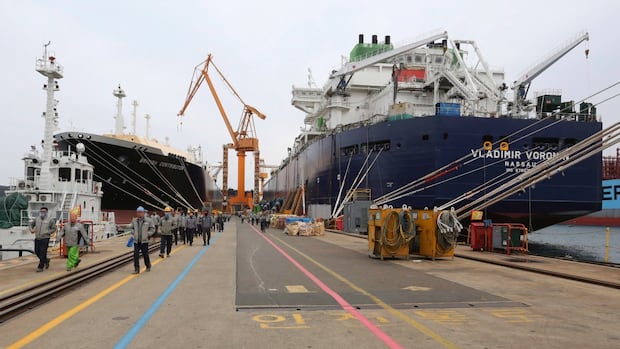An agreement to end public financing of foreign fossil fuel projects – which Canada helped lead on the world stage – has failed in the face of major opposition and the new administration of US President-elect Donald Trump.
Canada, along with the United Kingdom and the European Union, suggested In 2023, financing of oil and gas projects abroad through export credit agencies – government agencies that support foreign trade – will stop and the money will instead be redirected to clean energy.
The US under President Joe Biden only supported the agreement immediately after the presidential election in November last year and launched a frantic attempt to reach an agreement before Trump’s inauguration. Ultimately there wasn’t enough time.
The Organization for Economic Co-operation and Development (OECD) confirmed in a statement to CBC News that despite months of negotiations, an agreement has not been reached.
At the OECD, unanimous consent is required to conclude an agreement. Aside from delayed U.S. support, Turkey and South Korea were the other countries that held back due to energy security and economic concerns.
Trump, who has indicated he wants to expand oil production and is filling his Cabinet with oil-industry-friendly executives, is not expected to support such a deal to limit fossil fuel financing.
Nina Pušić, senior climate strategist for export finance at Oil Change International, an advocacy group that is closely following these conversations, said it was “a huge missed opportunity for climate.”
“I think the bigger picture is that if we want to achieve the goals of the Paris Agreement, we need to put our public money into financing a clean and fair energy transition, rather than digging the fossil fuel hole even deeper,” Pušić said.
How public finance encourages risky investments in fossil fuels
The proposal from the OECD, a group of 38 industrialized nations, is based on a pledge at the 2021 UN climate conference in Glasgow to phase out these types of fossil fuel subsidies and redirect the money to clean energy.
The proposal targeted a specific type of fossil fuel subsidies – those awarded by export credit agencies for international projects. It is public financing that helps to secure projects that could be risky and where it is difficult to obtain initial financing from private investors and banks. Once public funding is available, it is easier for projects to obtain additional private funding.
In Canada, that agency is Export Development Canada (EDC), which provides financing, bonding and insurance products for projects abroad involving Canadian companies, with the aim of promoting trade between Canada and other countries.

“One of the reasons why export credit agencies are also so important is that they de-risk investments. So they basically provide a credit guarantee or some kind of cover for a project, which then invites private sector investment,” Pušić said.
“That’s why they play such an important role in this ecosystem supporting the fossil fuel industry.”
For example, the U.S. Export-Import Bank provided a $500 million U.S. loan for a gas project in Bahrain in 2024 and a $100 million U.S. loan for an oil refinery in 2023 Indonesia. In the final days of the Biden administration, the bank agreed to an additional $500 million for a massive gas-fired power plant in Guyana.

Why some countries stuck to a deal
One of the biggest holdouts, South Korea, blocked negotiations due to concerns about its domestic industries that support liquefied natural gas (LNG). South Korea is the world’s second-largest fossil fuel financier, largely because it is the largest manufacturer of LNG tankers that transport the fuel around the world.
“With the global energy transition already underway, Korean companies that continue to focus on fossil projects will quickly fall behind,” said Dongjae Oh, who leads gas industry research at the Korean think tank Solutions for Our Climate.
“To maintain competitiveness, it is best not to invest in renewable energy projects,” he said.
Korean officials also expressed concerns that the country is not yet ready to transition away from fossil fuels to meet its energy needs and needs more time, Oh said. He said Korea spent an estimated $10 billion on international fossil fuel financing in 2020-2022 and that amount may increase.
The way forward for countries
Kate DeAngelis, deputy director of economic policy at the advocacy group Friends of the Earth US, said countries like Canada that supported the proposal must continue to negotiate despite the political changes in Washington.
“It is important to remember that under the first Trump administration, OECD countries were able to tighten restrictions on coal financing that were put in place,” DeAngelis said.
“These governments can’t use this as an excuse to just drop the ball.”

In 2023, Canada announced this expire “inefficient” fossil fuel subsidies – financing that encourages higher carbon emissions and hinders the transition to clean energy. Despite this, a report The advocacy group Environment Defense noted that Canada is still spending billions on oil and gas subsidies.
This is now EDC pledged to phase out direct financing of international fossil fuel projects, but it is also a big donor of domestic oil and gas.
DeAngelis said that despite the lack of an OECD agreement, countries can still keep their existing promises by eliminating loopholes and consistently restricting all fossil fuel subsidies.
“Countries are very good at making commitments. What’s much more difficult is making sure they actually comply,” DeAngelis said.


